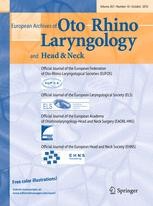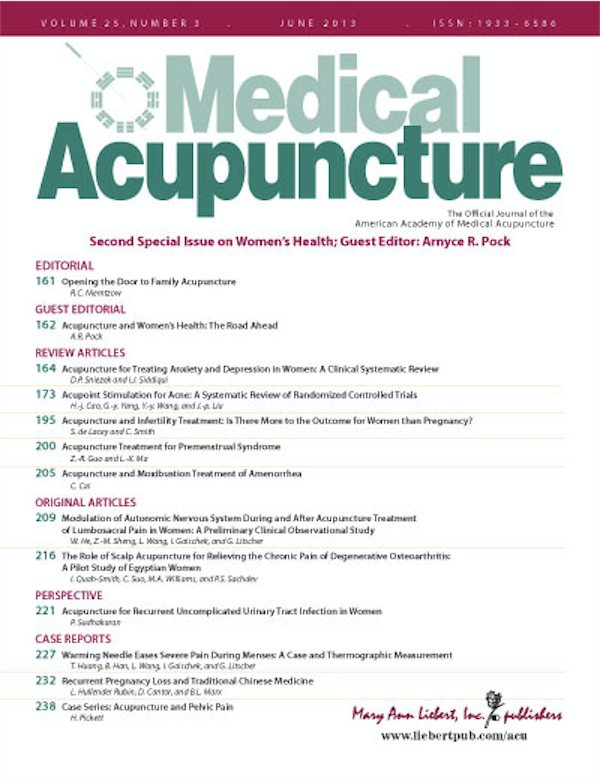Anosmia
How to submit an article:
- Registered users can submit any published journal article that has a unique DOI (Digital Object Identifier) name or link to Research Hub.
- For example, you can paste the full DOI link:
https://doi.org/10.1109/5.771073or just the DOI name:10.1109/5.771073into the field above and click submit. - The person who is first to submit a valid article to Research Hub will forever be credited for it, and every article submission earns you +6 Research Points.
Related Topics
Published research studies are articles that present the findings of original research that has undergone a peer-review process and has been made publicly available in scholarly journals, books or other media.

Acupuncture is associated with a positive effect on odour discrimination in patients with postinfectious smell loss—a controlled prospective study
2021 May 25 European Archives of Oto-Rhino-Laryngology Drews T, Hummel T, Rochlitzer B, Hauswald B, Hähner A
Randomised Controlled Trial AnosmiaAcupuncture may be an effective supplementary treatment option for patients with olfactory loss.

Waking Up and Literally Smelling the Coffee: Inducing Olfactory Function with 3-Phase Auricular Therapy
2019 Feb Medical Acupuncture Liebell D
For cases of loss of sense of smell, particularly those of unknown etiology, 3-phase auricular therapy (3PAT) and its required evaluation techniques should be considered.
Case Report Ear Acupuncture Anosmia
Recovery of Olfactory Function in Postviral Olfactory Dysfunction Patients after Acupuncture Treatment
2016 Feb 29 Evidence-Based Complementary and Alternative Medicine Qi Dai, Zhihui Pang, Hongmeng Yu
Randomised Controlled Trial AnosmiaTraditional Chinese acupuncture can potentially improve olfactory function in patients suffering from postviral olfactory dysfunction who don't respond well to standardized treatments.
Research insights are moderated by the Research Hub team and offer an at-a-glance overview of interesting research findings.

2021 European Archives of Oto-Rhino-Laryngology
Acupuncture may be an effective supplementary treatment option for patients with olfactory loss.
Randomised Controlled Trial
Acupuncture is associated with a positive effect on odour discrimination in patients with postinfectious smell loss—a controlled prospective study
Drews T, Hummel T, Rochlitzer B, Hauswald B, Hähner A

2016 Evidence-Based Complementary and Alternative Medicine
Traditional Chinese acupuncture can potentially improve olfactory function in patients suffering from postviral olfactory dysfunction who don't respond well to standardized treatments.
Randomised Controlled Trial
Recovery of Olfactory Function in Postviral Olfactory Dysfunction Patients after Acupuncture Treatment
Qi Dai, Zhihui Pang, Hongmeng Yu
Review Articles
Review articles summarise and critically evaluate the current state of research on a specific topic or field by synthesising multiple primary research studies.
Clinical Trials
Clinical trials are research studies that involve people and are conducted to evaluate the safety and efficacy of new treatments or interventions, such as drugs, medical devices, or behavioural therapies.

Acupuncture is associated with a positive effect on odour discrimination in patients with postinfectious smell loss—a controlled prospective study
2021 May 25 European Archives of Oto-Rhino-Laryngology Drews T, Hummel T, Rochlitzer B, Hauswald B, Hähner A
Randomised Controlled Trial AnosmiaAcupuncture may be an effective supplementary treatment option for patients with olfactory loss.

Recovery of Olfactory Function in Postviral Olfactory Dysfunction Patients after Acupuncture Treatment
2016 Feb 29 Evidence-Based Complementary and Alternative Medicine Qi Dai, Zhihui Pang, Hongmeng Yu
Randomised Controlled Trial AnosmiaTraditional Chinese acupuncture can potentially improve olfactory function in patients suffering from postviral olfactory dysfunction who don't respond well to standardized treatments.
Study Protocols
Published study protocols are detailed plans that outline the objectives, methodology, statistical analyses, and organisation of a research study that have been made publicly available for others to review and use as a reference.
Presentation Slides

Randomised Controlled Trial
Acupuncture may be an effective supplementary treatment option for patients with olfactory loss.
Drews T, Hummel T, Rochlitzer B, Hauswald B, Hähner A

Randomised Controlled Trial
Traditional Chinese acupuncture can potentially improve olfactory function in patients suffering from postviral olfactory dysfunction who don't respond well to standardized treatments.
Qi Dai, Zhihui Pang, Hongmeng Yu
Executive Summary
Write an executive summary in the form of a blog article on the topic of "Research into Chinese medicine treatment for Anosmia" summarising the research below and using language that can be easily understood by patients and avoiding medical jargon using a professional and caring tone of voice.
Write an executive summary in the form of a blog article on the topic of "Researched Chinese medicine treatments for Anosmia" summarising the research below in an objective and easy to understand way, and using language that can be easily understood by patients. Group the article into Chinese medicine treatments first, followed by nutrition and other treatments. Avoid using medical jargon and use a professional and caring tone of voice.
Write me a concise but easy to understand executive summary on the topic of "Chinese medicine treatments for Anosmia" based on the following research that I will give you. Your summary should be 2 paragraphs long in Australian English spelling and include references to the studies.
A Randomised Controlled Trial published in 2021 in the journal European Archives of Oto-Rhino-Laryngology found that Acupuncture may be an effective supplementary treatment option for patients with olfactory loss. Sixty patients with smell loss following infections of the upper respiratory tract were included in this investigation Half of the study group were randomly assigned to verum acupuncture and the other half to sham acupuncture Olfaction was measured by means of the “Sniffin’ Sticks” test battery (odour threshold, discrimination and identification). Compared to sham acupuncture, verum was associated with an improvement of smell function as measured by the TDI score. The improvement was largely determined by improvement in odour discrimination, and was significantly better in patients with a shorter duration of the disorder.
A Randomised Controlled Trial published in 2016 in the journal Evidence-Based Complementary and Alternative Medicine found that Traditional Chinese acupuncture can potentially improve olfactory function in patients suffering from postviral olfactory dysfunction who don't respond well to standardized treatments. The study utilised a sample of 50 patients with postviral olfactory dysfunction, who found little to no relief with standardized treatments. These participants were split into two equal groups: one group was subjected to traditional Chinese acupuncture, while the other group served as an observation or control group, who received no new intervention. The researchers then applied subjective olfactory tests using the University of Pennsylvania Smell Identification Test to measure the impact of acupuncture treatment on the participants' sense of smell. The results indicated that 11 out of 25 patients who had undergone acupuncture therapy showed improved olfactory function compared to only four from the observation group. It was observed that there wasn't a significant difference in recovery rates based on factors such as age, gender, or duration of disease between both groups. However, findings indicated that patients whose sense of smell was weak (hyposmic) responded to acupuncture therapy better than those who had completely lost it (anosmic).
Moderation Tools
Topic
Sign In
Users not signed in are limited to viewing the 5 most recent items of content.